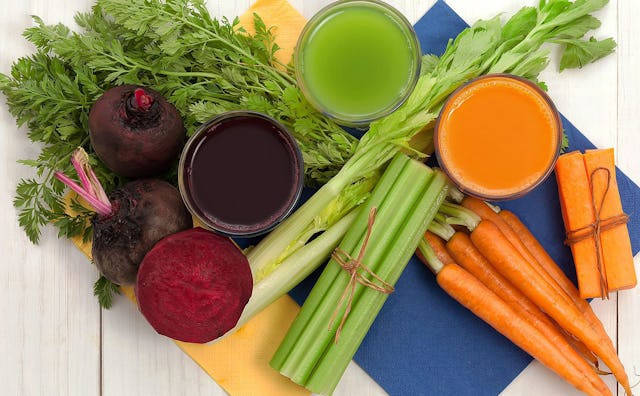It's Time to Detox From Detoxes

I usually keep quiet about these things, despite the voice inside my head that wants to offer my condolences to these abstainers on their recently diagnosed celiac disease, diabetes or alcoholism. In my experience, most of the people who go on these cleanses have none of these, and already eat well and exercise regularly. So why does it have to be so extreme? Is moderation not a thing anymore? Am I a bad mother for not taking care of my own health and longevity through deprivation and caffeine withdrawal? Will my children curse me one day for my inability to turn 20 different pieces of fruit into a power drink and skip meals for a few days? Will I miss out on my own grandchildren because I like to eat regular meals?
Reassuringly, I will not.
In a world where Dr. Oz is finally getting called out for all of his cockamamie theories about weight loss, a new voice is out there, asking to be heard: Alan Levinovitz. On the surface, he might not seem qualified to discuss such things since he’s not a doctor or nutritionist—he’s an assistant professor of Chinese philosophy and religion at James Madison University. But it’s this that has allowed him to see the detox trend through the cultural lens as well as a scientific one, and in his book The Gluten Lie, he’s telling us to quit it.
Let’s start with gluten, the bugaboo of the moment, and now a multi-billion dollar industry. Stats tell us that in addition to people who have celiac disease (for whom gluten is truly harmful), there’s another 6 percent of the population who have gluten sensitivity. The rest of us are actually not harmed by it. So why is everyone so afraid of it? The culprit, it seems, is magical thinking.
Professor Levinovitz connects his studies of Chinese religion to the current fads in modern dieting. “Nearly 2,000 years ago, a group of monks claimed that if you avoided eating grains, you could live forever, clear up your skin, resist disease, fly, and teleport. Then, a couple hundred years later [their] prohibition shifted from grains to meat but the promises stayed the same. These same monks also said that people needed to take special, secret, expensive supplements if they really wanted to live forever.”
Is that why gluten-free Girl Scout cookies cost a dollar more than the other ones?
Levinovitz suggests that the latest fad of cleansing, of so-called “clean” food, and of detoxing is just a way to make people feel better and distinguish themselves from “icky regular people who can’t see the truth.”
He covers the Atkins diet, the Paleo diet, and the list of diseases that gluten supposedly causes or makes worse, which include autism, Alzheimer’s, cancer, and ADHD. He also delves into the verbiage that obsesses us. “Real food” is the big one now, a phrase I hear a lot, along with “real bodies.” Doesn’t everyone have a real body? And isn’t all food real, unless we’re dreaming about it instead of actually eating it?
I do feel vindicated when I read that detoxing isn’t the cure-all for our suffering. As blogger SciBabe points out, we have kidneys and a liver, which take care of detoxing for us. That’s their job.
“Of course it’s a little more complicated than that,” says Levinovitz, who still agrees with SciBabe. “Factory workers can get heavy metal poisoning, for example, and they really do need medical attention to have those poisons removed from their body. But drinking $11 bottles of fresh-pressed juice isn’t going to remove anything, except for money from your bank account.”
I may be a little overly gleeful about these kinds of statements because they echo sentiments I already have. The biggest thing we need to detox from is the idea that we need to keep punishing ourselves and “cleaning” our bodies out from who knows what. From a health standpoint, here’s what I say: If you’re eating well and living a healthy life, what on earth is wrong with enjoying it?
This article was originally published on